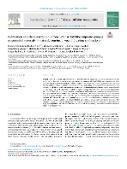Fabrication and characterization of new levan@CBD biocomposite sponges as potential materials in natural, non-toxic wound dressing applications

Autor
Chełminiak-Dudkiewicz, Dorota
Długaszewska, Jolanta
Wujak, Magdalena
Smolarkiewicz-Wyczachowski, Aleksander
Bocian, Szymon
Mylkie, Kinga
Gośliński, T.
Marszałł, Michał P.
Ziegler-Borowska, Marta
Datum vydání
2023Publikováno v
International Journal of Biological MacromoleculesRočník / Číslo vydání
253 (December)ISBN / ISSN
ISSN: 0141-8130Metadata
Zobrazit celý záznamTato publikace má vydavatelskou verzi s DOI 10.1016/j.ijbiomac.2023.126933
Abstrakt
Wound healing is a complex process; therefore, new dressings are frequently required to facilitate it. In this study, porous bacterial levan-based sponges containing cannabis oil (Lev@CBDs) were prepared and fully characterized. The sponges exhibited a suitable swelling ratio, proper water vapor transmission rate, sufficient thermal stability, desired mechanical properties, and good antioxidant and anti-inflammatory properties. The obtained Lev@CBD materials were evaluated in terms of their interaction with proteins, human serum albumin and fibrinogen, of which fibrinogen revealed the highest binding effect. Moreover, the obtained biomaterials exhibited antibacterial activity against Staphylococcus aureus and Pseudomonas aeruginosa, as well as being nonhemolytic material as indicated by hemolysis tests. Furthermore, the sponges were non-toxic and compatible with L929 mouse fibroblasts and HDF cells. Most significantly, the levan sponge with the highest content of cannabis oil, in comparison to others, retained its non-hemolytic, anti-inflammatory, and antimicrobial properties after prolonged storage in a climate chamber at a constant temperature and relative humidity. The designed sponges have conclusively proven their beneficial physicochemical properties and, at the preliminary stage, biocompatibility as well, and therefore can be considered a promising material for wound dressings in future in vivo applications.
Klíčová slova
Levan, cannabis oil, Antibacterial activity, In vitro biocompatibility test, Wound dressing
Trvalý odkaz
https://hdl.handle.net/20.500.14178/2136Licence
Licence pro užití plného textu výsledku: Creative Commons Uveďte původ 4.0 International







